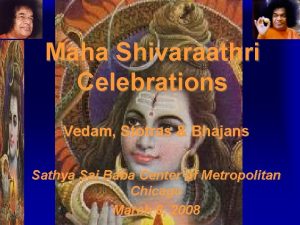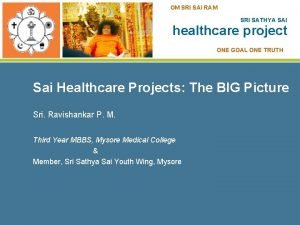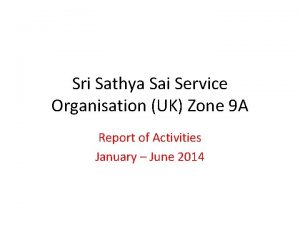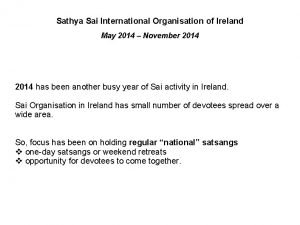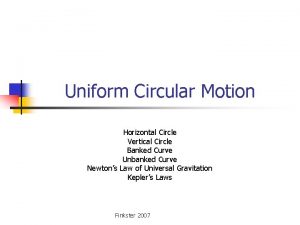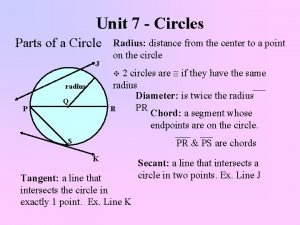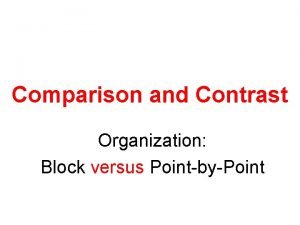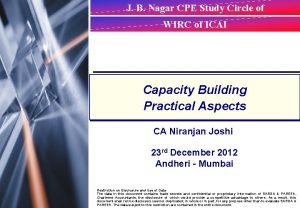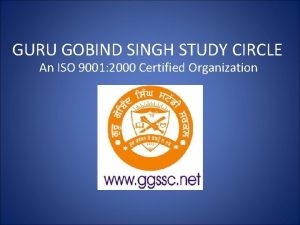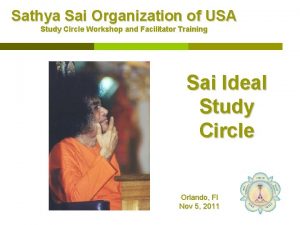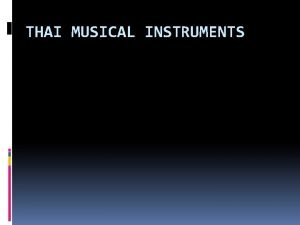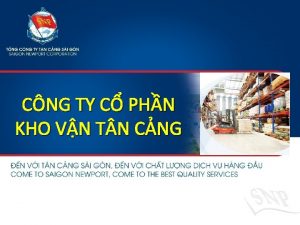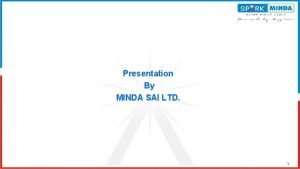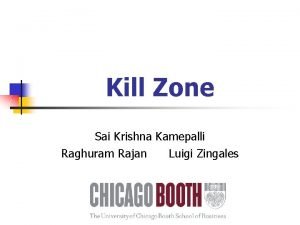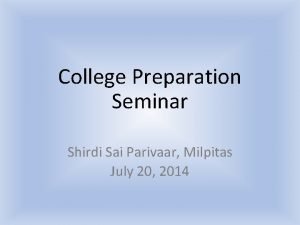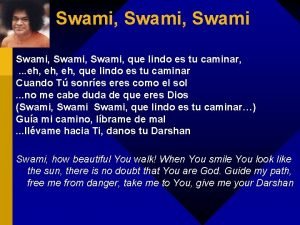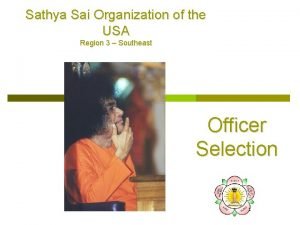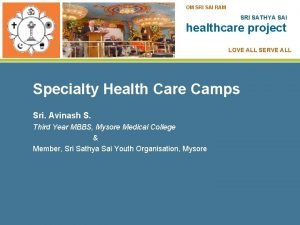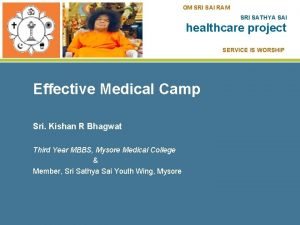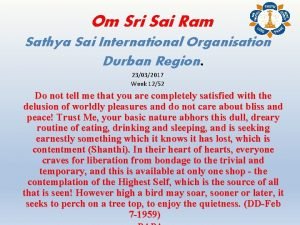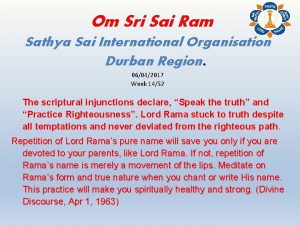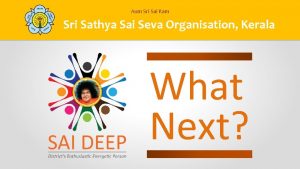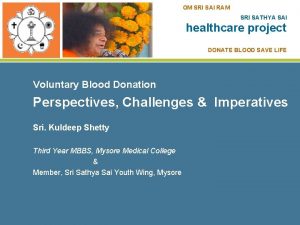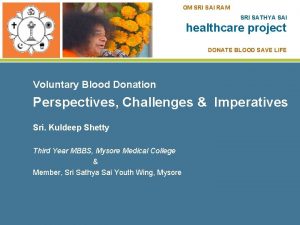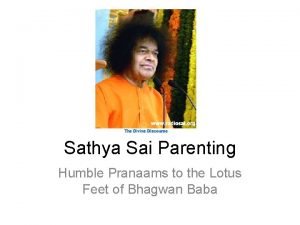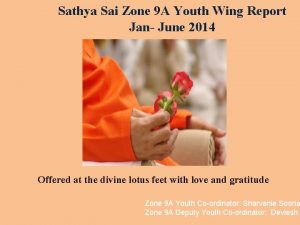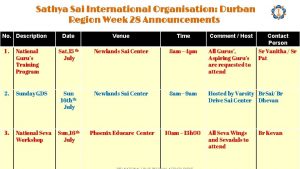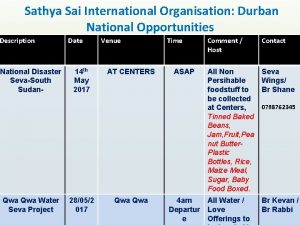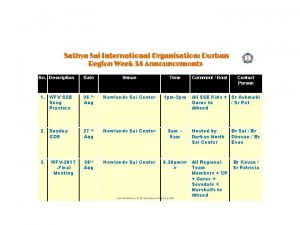Sathya Sai Organization of USA Study Circle Workshop




































- Slides: 36

Sathya Sai Organization of USA Study Circle Workshop and Facilitator Training Sai Ideal Study Circle Orlando, Fl Nov 5, 2011

Why Study Circle? For Sai Devotee - Simple Answer p Swami advises p

Balance Spiritual Practice Devotional Singing Service

Balance Spiritual Practice Study Circle Devotional Singing Service

Ladder Service

Ladder Service Devotional Singing

Ladder Service Devotional Singing Study Circle

Spiritual Journey

Spiritual Journey

Study Circle - Not Just Reading “It is not just reading books. Circle, study circle means taking a point and each person discussing what is the meaning of the point to them—like a round table conference. Each person gives his point of view, and finally values are derived from this. ” Conversation With SSB, pp. 125 -126 (152 pages) p "If each one only reads, this may go on for a year or two, then an allergy to reading develops. ” Conversations with SSB, by Hislop p 137, 138 p

Study Circle - Practical p “Delve into the significance and the meaning of what you read, and always have before you the goal of putting what you read into practice. Unless you do so, the study circle will remain a half-circle forever; it cannot be a full circle. ” Sathya Sai Speaks 9, p. 59

Study Circle - Practical p “What is eaten should be digested and then only you should eat again. In the same way, you should listen {eat) in the Study Circle and put into practice (digest) what you have learnt. … Now what you are doing is only loading and no unloading. How much can you sustain like that? So, you should go on loading and unloading, listening and practicing. You have to practice whatever you have learnt. Then only it becomes a real Study Circle” 30 -1 -1985

Study Circle - Transformation p “Theoretical knowledge is a burden, unless it is practiced, when it can be lightened into wisdom and assimilated into daily life. ” Sathya Sai Speaks 9, p. 56 p “Not information, but transformation, not instruction but CONSTRUCTION should be the aim. ” Sathya Sai Speaks 9, p. 56

Group Synergy p “The topic is viewed; the study circle looks at different facets. It is like a diamond with its different facets, but there is one facet that is flat, the top facet, and from this all can be viewed. To discover the top facet is the task [purpose] of study circle” Conversation With Sathya Sai Baba, pp. 125 -126 (152 pages)

Who is responsible? p p p n p n Devotional Coordinator Can delegate Facilitator Rotate position (perhaps semi-annually) Presenter Rotate position (weekly or monthly) Scribe (optional) Rotate position (weekly or monthly)

Facilitator Requires skill p Skill comes with practice p Skill improves with training p n Consider Facilitator training sessions

Facilitator Tasks p p n p p Set schedule of presenters for upcoming week and coordinate themes and topics covered Announce during center announcements upcoming topic and perhaps the last practical suggestions for the week. Reach out to YA reps to encourage participation Keep on time Set time limit for comments with help of group (2 -3 minutes) Keep focused on topic Keep orderly progression. Help direct who is next if not clear.

Facilitator Tasks p Encourage all to contribute n n p Limit those who dominate or veer off topic n p lovingly with gentleness How to correct a wrong statement n p lovingly draw out, but without pressure or obligation Give those who passed an opportunity to share before conclusion When important to intervene, when better to ignore. How to lovingly correct someone violating a rule.

Presenter Tasks p n p p n Prepares topic for week Key is to be practical. Minimize use of Foreign words, esoteric philosophical concepts - unless simply expressed. Gives theme and quote, and perhaps one or two practical questions in about 5 -10 minutes. Summarize all viewpoints, not just their own. Can attempt to present the top facet. Pose a few practical affirmations, tasks, "homework" to work on for this coming week. (Since this position is rotated, it is a nice way to have different devotees present the last word)

Participant p p Not just an observer Analogous to devotional singing, where we should participate by singing and clapping and tune into our love for God together along with the group Analogous to service project, where we should take part and serve rather than standby and watch. Someone may get a better understanding with your shared thought. You may be the instrument Swami uses to help the group or a person in the group

Participant p p Sharing our thoughts is a service to the group. “In the Study Circle, whatever we listen and assimilate in the mind should be distributed to others. In that way we show gratitude for what we have received. We should not listen and keep it to ourselves only for our benefit. ” 30 -1 -1985

Participant p p p Be earnest and have faith in importance of exercise Participate and contribute during Study Circle and sincerely make effort to put into practice the following week Realize the power of Unity. Just as when we sing together it is more powerful and when we serve together it more powerful, when we study and practice teachings togethere is power.

Possible Comments p p Give an opinion on what something in the passage meant. Pose a question that the passage brings to mind. Answer a question that someone previously posed. Discuss how you have practically struggled or succeeded in apply related teachings in day to day life

Practical Points - Overview No Experts p n n No commenting on others points, no correction or taking sides Better to say: “the way I understand it is this…. ” Discipline of waiting turn p n n Trust the collective conscience of group Ego check Rotation of presenters p n Ego check Relay personal, practical efforts on success and failure of applying spiritual principle being discussed End meeting with 1 or 2 points to apply this coming week Reporting back to group on the last session and how fared in putting into practice this past week’s lessons p p p n Hearing about each others attempts to practice helps strengthen our faith and effort.

Practical Points – Prior to start p p p Arrange for chairs to be in actual circle Name tags helpful Presenter handouts placed on chairs Arrange for timer with gentle chime or music (have agreed on response time) Arrange for microphone if necessary

Practical Points - Starting p Facilitator n n a formal welcome asks Swami to guide the group asks for trust in the collective conscience of group Briefly reviews purpose and rules p p p goal of practicality and transformation. orderly sequence time limit No commenting Presenter n n gives theme and quote, and perhaps one or two practical questions in about 5 -10 minutes. Asks everyone to reflect silently for 20 -30 seconds, then asks for volunteer to start.

What is the ideal topic? p p p Direct Sathya Sai Quotes Not interpretation or understanding of Sai Quotes Practical topics helpful in day to day lives n Avoid esoteric philosophical concepts n Avoid having to review extensive vocabulary terms p p Bible or Koran Passages: Interpretations based upon Swami’s quotes Holiday themes from various faiths n Ramadan, Hanukah, Easter, Prashanti festivals

Common Pitfalls p p p p p Perceived Expert School classroom dynamics Rush to finish agenda or syllabus Esoteric philosophical topic without practical relevance List of extensive terms requiring definition Veering off topic Personal therapy session Commenting on others statements Speaking out of order

Best Practices p Video Introductions n Swami’s discourse for 10 -15 minutes n Radio. Sai video for 10 -15 minutes

Best Practices p Use of blackboard (or projector) n Write down ideas as presented n Write down questions

Best Practices p p p Have Swami have the last word: End with a quote Share examples from Swami Make interesting by sharing our struggles in how we apply Swami’s directives Give specific point for all to try and apply for the upcoming week Start session reviewing specific experiences of trying to apply last weeks topic

Best Practices - Topics p Use practical topics of interest to group: n Parenting issues n Marriage related issues n Work related issues n Teen/YA issues

Best Practices - Topics p Bible passages seen in through the lens of Swami’s teachings. Include Swami quotes. Koran passages seen through the lens of Swami’s teachings. Include Swami Quotes. Holiday themes from various faiths p Center related topics: p p n Devotional singing n Service n Study Circle

Best Practices - Topics p Themes to Explore: n What is Love? n What is Grace? n What is Surrender? n What is Forbearance? n What is Spirituality? How to apply it in an practical manner in my daily life? n How to practice Patience practically in my daily life? n What are the ways Meditation can be incorporated into my life? n What is true Friendship? n Practicing the presence of Swami in my daily life n How to practice being the witness in my daily life?

Best Practices - Topics p Themes to Explore: n Why do we criticize others? How can we begin to stop? n In what ways does Jealousy interfere with relationships? How to remedy this tendency? n Can you give love to others if you do not love yourself? n What develops Self-Esteem? n Name the obstacles to unity of thought word and deed? n Why don’t we recognize the oneness in each other? n What does transformation of the heart mean to you? How to put into practice? n What are the causes of stress in our life? How to reduce them?

Sathya Sai Study Circle Feedback Orlando, Fl Nov 5, 2011
 Mangalam guru devaya
Mangalam guru devaya Ashta daridra
Ashta daridra Mantra pushpam meaning
Mantra pushpam meaning Om sri sathya sai baba
Om sri sathya sai baba Sathya sai organisation uk
Sathya sai organisation uk Sathya sai international organisation uk
Sathya sai international organisation uk Sathya deposited rs 6000
Sathya deposited rs 6000 Sathya robot
Sathya robot Dr anuradha sathya
Dr anuradha sathya Guesstimate market sizing
Guesstimate market sizing Capte self study workshop
Capte self study workshop F vertical
F vertical What is the point of tangency in circle j?
What is the point of tangency in circle j? Inequality open circle or closed
Inequality open circle or closed Geometry circles
Geometry circles Process organization in computer organization
Process organization in computer organization Alternating pattern essay
Alternating pattern essay Jb nagar cpe study circle of wirc of icai
Jb nagar cpe study circle of wirc of icai Guru gobind singh study circle books
Guru gobind singh study circle books Pnppn
Pnppn Guru gobind singh study circle
Guru gobind singh study circle What different levels of organization do ecologists study
What different levels of organization do ecologists study Mos championship 2019
Mos championship 2019 Thai musical instruments
Thai musical instruments Anger management charlotte nc
Anger management charlotte nc Cfs.saigonnewport
Cfs.saigonnewport Sai kung swimming pool
Sai kung swimming pool Matt carver sai
Matt carver sai Sai minda company chakan
Sai minda company chakan Ho sbagliato tante volte ormai che lo so già
Ho sbagliato tante volte ormai che lo so già Nú sai do ventre de minha mãe musica
Nú sai do ventre de minha mãe musica Saida mak vizaun
Saida mak vizaun Sai krishna kamepalli
Sai krishna kamepalli Montale forse un mattino
Montale forse un mattino Shirdi sai parivaar milpitas
Shirdi sai parivaar milpitas Sai sustainable agriculture initiative
Sai sustainable agriculture initiative Ven mi sai rama
Ven mi sai rama

